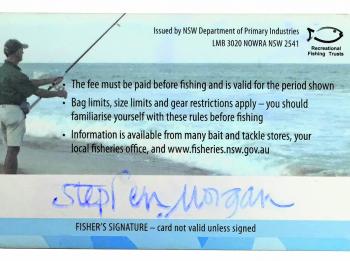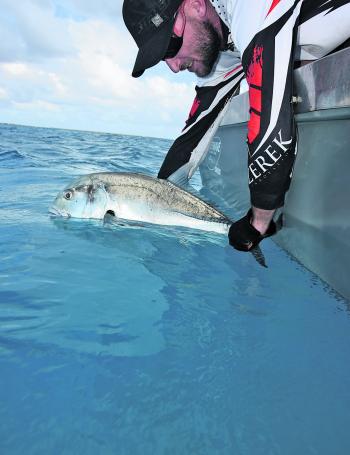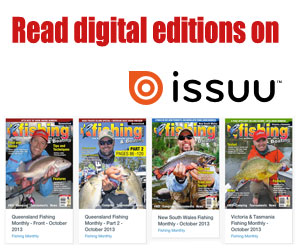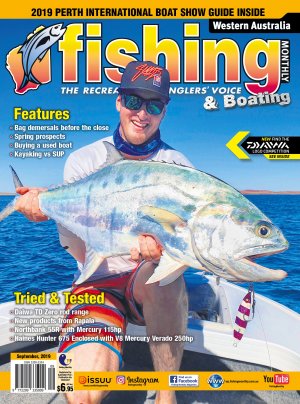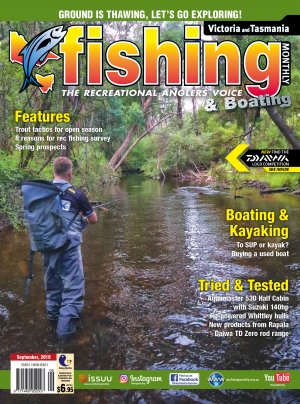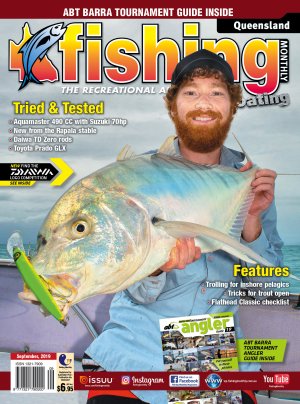Queenslanders are lucky in many ways. Our beautiful climate, beautiful beaches, three of the world’s largest sand islands and a fantastic variety of fishing. Unfortunately though, there are a couple of areas where we are still behind the eight ball compared to the rest of Australia. One such area is the lack of net-free zones across the state. This has been compounded by the lack of an all waters recreational fishing license and all the benefits it brings.
For around the cost of a packet of cigarettes or less than a carton of beer a year, Queenslanders could have net-free fishing areas across the state. Trust funds from the license could be distributed according to the choices of a board of recreational anglers and their representatives. The improvements to catch rates in net-free areas, and use of the trust funds for local projects such as fish restocking and improvements to fishing and boating infrastructure, would boost local tourism and job growth in the designated areas.
The alternative to a licence is more of the same ad-hoc decision-making by governments on net-free areas, continued pressure from the anti-fishing lobby to lock up more areas from fishing, and the loss of interstate and international tourists. A lack of tourism dollars forces governments to find more revenue from other taxes and charges. Overall, the benefits to individual anglers easily outweighs the low cost of buying a licence.
This article outlines a range of the recreational fishing licenses (RFL) in place across Australia and the benefits they have brought. It also includes the views of Sunfish and two of Australia’s biggest fishing industry names on this topic. It also discusses the best ways the license might work.
While the current Queensland government has taken some steps in the right direction with a couple of net-free zones, the actions and areas are too small and scattered to be of wider benefit. The benefits of a recreational fishing license (RFL), demonstrated in other states and outlined below, are reaped not only by anglers, but also by the local tackle industry, fishing guides and charter operators, the accommodation industry and a range of other retail outlets in the net-free areas, or areas benefitting from the trust funds.
Just this year, fishing tourism has been highlighted as a target area for growth in international visitors by one of Australia’s peak tourism organisations, Tourism Australia. Imagine the selling point to these potential visitors if we set aside large, recreational-only fishing areas in Queensland!
For those anglers who think that more people fishing is a bad thing, think about it this way. With more numbers comes a greater voice. With more people buying licenses comes more money in the RFL kitty to introduce more net-free areas, and with more tourism for the QLD economy comes greater revenue to our government, more jobs and growth for the Australian tackle industry and other small local tourism businesses.
Bruce Alvey is to QLD fishing, like Wally Lewis is to QLD rugby league: the King! So when Bruce talks about fishing, it’s worth listening to. At a recent tour of the Alvey Reels Australia factory at Carole Park, Brisbane, I asked Bruce his views on a RFL. Bruce is strongly in favour of a RFL due to the benefits it brings not only in terms of the fishing, but the value of the fish in the water to the industries mentioned above. However, Bruce did say that a RFL should be subject to a number of conditions, including:
• The funds are held in trust for use by recreational fishing sector only (not consolidated revenue);
• The existing stocked impoundment levy is rolled in; and
• The QLD Department of Transport department remove the Private Pleasure Vehicle (PPV) levy currently charged to boat owners.
David Bateman, the Secretary and Deputy Chairman of Sunfish, agrees. He said that the conditions Bruce mentioned were included in Sunfish’s submission to Fisheries Queensland. The Sunfish submission also included recommendations on fees being $5 for three days, $10 for a month and $30 for a year. Sunfish are cautious on providing an option for a long-term license (in NSW you get a discount over three years) until the scheme is bedded down. However, I personally was happy to fork out for a three-year license in NSW to save money and to not worry about it for a few years.
Sunfish also propose that the RFL be free of charge for people under 18 years of age, pensioners to receive a discount and for no charge for people over 70 years of age. David also indicated that the payouts of commercial fishers in designated net-free zones be similar to the compensation provided in NSW and Victoria, adjusted for inflation, and should be for active commercial licenses only. If the payouts were for latent commercial licenses (i.e. ones that aren’t being used), it would make no difference to the fishing pressure.
Based on some research by the University of Queensland, Sunfish estimate that RFLs in QLD could generate $15-$20m a year. That is a lot of money which can be reinvested into recreational fishing but, as David points out, the key is “If you pay you have a say”. That is, it should be managed by a board of recreational angler representatives who decide on the use of the funds, and these decisions should not be subject to Ministerial approval.
RFLs are nothing new. In fact, QLD anglers who have previously lived in other states would wonder what all the fuss and delays are about. NSW introduced an ‘All waters’ RFL in 2003 and Victoria in 2001. West Australia has a freshwater license system and in 2010 introduced a Recreational Fishing from Boat License (RFBL). Tasmania also has an inland fishing license. All have been extremely successful in not only improving the fishing by removing nets in a number of areas, but the trust funds set aside from the fees have been used for fish stocking, fishing infrastructure and compensating commercial fishers impacted by the net-free areas.
I lived in the ACT when the NSW RFL was introduced, so I was well aware of the initial hesitation of some anglers. However, when the funds were used to buy out heavily netted areas, the fishing in those areas improved dramatically, almost immediately. My mates and I always fished Tuross Lake regularly, and we went from struggling to catch a feed to catching and releasing up to 30-40 fish in a session under the right conditions. In fact, the fishing is so good that since I have moved back to Queensland, I have happily pulled my own boat down there with my family in recent years. A trip of over 1300km one way!
And I'm not the only one. At the caravan park I spoke to other anglers from Victoria and NSW who do the same thing. Imagine the benefits to local businesses, and extrapolate that out to all of the RFLs in the whole of the state!
Furthermore, not long after the introduction of the RFL, NSW anglers started to see the flow-on benefits of the funds from the trusts being used for other recreational fishing purposes. Suddenly, the attitudes of anglers changed. These attitudes and the benefit of RFLs are best summed up by one of Australia’s best known and loved fishing advocates and media personalities, Steve ‘Starlo’ Starling. Starlo was kind enough to give me his thoughts on the topic for inclusion in this article.
"While a lot of New South Welshmen were unsure or cynical about the introduction of an all-waters fishing licence, you'd be hard pressed to find many keen anglers in this state today who don't think it has been a good thing overall, and who wouldn't happily pay a bit more if they could be sure the funds generated were being well spent,” he said. “Licences are a wonderful tool for empowering anglers, not to mention a useful mechanism for generating statistics about participation in the sport. For better or worse, we live in an age of 'user pays' and until we dig in our own pockets and put our money where our mouth is, it's hard for decision makers to take us seriously, or perceive us as a valid lobby group."
Starlo makes a number of very good points. Apart from all the fishing and trust fund benefits, governments need good data for good decision making. Successive QLD governments have run recreational fishing surveys over the last decade, but the sample sizes haven’t been very small and the selected areas weren’t representative of the whole state. When you look at the data over time, some of the results are inconsistent and make no sense. The RFL will provide much better information on angler numbers and presence across the state, and thus be a valuable tool for trust fund decision making – provided it is managed properly by anglers and their industry representatives, not bureaucrats.
By introducing a RFL, QLD Fisheries would not need to re-invent the wheel – they can just look at how things are done in other states like NSW. Like everything, there are areas of the RFLs which require fine tuning. However, ask most anglers if they’d prefer to go back to the days of netting, or relying on consolidated revenue for stocking or infrastructure improvements, and the answer would be a resounding no.
In NSW, all money raised by the Recreational Fishing Fee is placed into the Recreational Fishing Trusts and spent on improving recreational fishing in NSW. These trusts are regulated by law and overseen by two committees made up of recreational fishers – one for saltwater and one for freshwater.
NSW DPI says that money accumulated in the recreational fishing trusts from the license fees goes towards a number of different activities and projects. These include:
• Recreational fishing enhancement programs;
• Recreational fishing education;
• Fishing access and facilities;
• Aquatic habitat protection and rehabilitation;
• Enforcement of fishing rules;
• Small Grants Program;
• Fishing fee coordination and payment network; and
• Research on fish and recreational fishing.
Each year the Victorian Government, through the Recreational Fishing Licence Trust Account, distributes revenue from the sale of RFLs to projects that will improve recreational fishing in Victoria. This initiative is called the Recreational Fishing Grants Program.
According to their website (www.agriculture.vic.gov.au ), since 2001 the Recreational Fishing Grants Program (RFGP) has funded over 600 projects, worth more than $21 million throughout Victoria. The RFGP comprises three separate programs including:
• A Small Grants Program that is continually open to fund small projects (up to $5,000);
• A Large Grants Program (for projects from $5,001 to $100,000); and
• A Commissioning Program for large priority projects (generally in excess of $100,000).
RFL revenue continues to be provided for fish stocking.
Since they were introduced in 2010, license funds from the Recreational Fishing from Boat License (RFBL) in WA have been spent on a number of initiatives of direct benefit to recreational fishers in Western Australia.
Some of the more recent initiatives include:
• Additional Fisheries mobile patrol units;
• Artificial reef pilot study;
• Barramundi restocking project to establish a world-class trophy barramundi fishery in the Kimberley;
• Fishing survey collecting data about who is fishing where and what they are catching; and
• Recreational fishing initiatives where $1m-$1.5m, is set aside each year for local grants. Examples have included Fish Aggregating Devices (FADs) deployed off the WA coast; funding for about 250 tackle stores to provide recreational fishing brochures, stickers and other information to recreational fishers; and educational fishing trips for underprivileged children in the East Kimberley (source: www.fish.wa.gov.au ).
The QLD government has just released a ‘green paper’ on fisheries management reform in QLD. Unfortunately, a RFL is not highlighted as an item high on the agenda. Instead, we’re looking at more of the same slow processes for introducing net-free zones in limited areas. We can make a difference though – and here is your opportunity to have your say. Public consultation is open until Friday, 30 September. Get online at www.daf.qld.gov.au and tell them it’s time QLD caught up with the other states and put fisheries management in the hands of recreational fisheries representatives using trust funds from a RFL. Without a RFL, we can expect proliferation of marine parks pushing commercial netters into smaller areas, thus putting more pressure on those areas for recreational fishers.
With the above in mind, here is my simple eight point plan:
1. Introduce a RFL in QLD to cover fresh and saltwater fishing.
2. Set up a recreational fishing industry taskforce to identify areas of best potential for net-free areas across the state (freshwater and saltwater).
3. Consult with affected commercial netters on the areas and provide fair compensation for any buy-outs, considering other state buy-back models. Ensure any licenses bought out aren’t simply redistributed to other parts of the state.
4. Government discussion and consultation on the fees, with discounts and exemptions applying as per other states.
5. Establish trust funds and boards to oversee use of the funds, made up of recreational anglers and industry associations for freshwater and saltwater. Ensure there are funds for not only major initiatives but local grants also.
6. Remove the Private Pleasure Vehicle (PPV) levy from boat registration fees so the government is not double dipping.
7. Fees to be fixed based on recommendations of Sunfish.
8. Exclusions on fee payments for the young, elderly and disadvantaged.
So log on and have your say. It is time QLD had a Recreational Fishing License!
Reads: 6339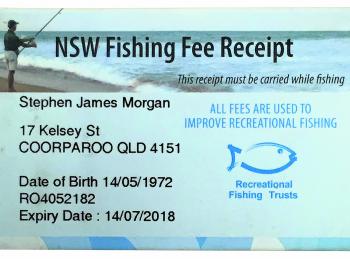
In NSW, all the money raised by the Recreational Fishing Fee is spent on improving recreational fishing.
